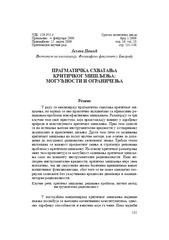Pragmatička shvatanja kritičkog mišljenja - mogućnosti i ograničenja
Pragmatic conceptions of critical thinking: Possibilities and limitations
| dc.date.accessioned | 2021-10-12T10:54:53Z | |
| dc.date.available | 2021-10-12T10:54:53Z | |
| dc.date.issued | 2009 | |
| dc.identifier.issn | 0354-5989 | |
| dc.identifier.uri | http://reff.f.bg.ac.rs/handle/123456789/835 | |
| dc.description.abstract | U radu se analiziraju pragmatička shvatanja kritičkog mišljenja, po kojima se ono praktično izjednačava sa efikasnim rešavanjem problema ili efektivnim mišljenjem. Razmatraju se tri ključne teze ovog pristupa, koje predstavljaju novinu u određenju prirode i konstituenata kritičkog mišljenja. Prva teza odnosi se na isticanje njegove instrumentalne vrednosti u ostvarivanju akademskih i praktičnih ciljeva. Druga teza tiče se zasnivanja kritičkog mišljenja na pojmu naučne metode, kao osnove za dolaženje do pouzdanog racionalno zasnovanog znanja. Trećom tezom naglašava se važnost predmetnog znanja i strategija rešavanja problema u kritičkom mišljenju. Na osnovu kritičkog razmatranja ovih teza preispituje se mogućnost zasnivanja kritičkog mišljenja samo na konceptu instrumentalne racionalnosti. Iako nesporne instrumentalne vrednosti, kritičko mišljenje nije uvek isplativo, čak ni svojstveno nekim bazičnim principima našeg kognitivnog funkcionisanja, zbog čega se ne može adekvatno teorijski zasnovati bez uključivanja vrednosne dimenzije i emancipatorne racionalnosti. | sr |
| dc.description.abstract | In this paper we analyze the pragmatic conceptions of critical thinking, that conceptualize it as an efficient problem solving or effective thinking. Three central thesis of this approach are explored, as its innovative contribution in defining the nature and constitutive elements of critical thinking. The first thesis refers to the instrumental role of critical thinking in achieving academic and practical aims. The second thesis deals with constitutive role oh scientific method, as a basic tool in gaining the reliable and reasonable knowledge. The third thesis stresses the importance of the subject domain knowledge and problem solving strategies in critical thinking. By scrutinizing these theses, we question whether critical thinking can be justified only by the concept of instrumental rationality. We argue that critical thinking, although of great instrumental value, cannot be only instrumentally justified, due to the fact that it is not always useful or even consistent with some basic principles of our cognitive functioning, as well as that it cannot be adequately conceptualized without its value dimension and emancipatory rationality. | en |
| dc.publisher | Institut za političke studije, Beograd | |
| dc.relation | info:eu-repo/grantAgreement/MESTD/MPN2006-2010/149018/RS// | |
| dc.rights | openAccess | |
| dc.source | Srpska politička misao | |
| dc.subject | rešavanje problema | sr |
| dc.subject | naučni metod | sr |
| dc.subject | kritičko mišljenje | sr |
| dc.subject | instrumentalna racionalnost | sr |
| dc.subject | scientific method | en |
| dc.subject | problem solving | en |
| dc.subject | instrumental rationality | en |
| dc.subject | critical thinking | en |
| dc.title | Pragmatička shvatanja kritičkog mišljenja - mogućnosti i ograničenja | sr |
| dc.title | Pragmatic conceptions of critical thinking: Possibilities and limitations | en |
| dc.type | article | |
| dc.rights.license | ARR | |
| dc.citation.epage | 148 | |
| dc.citation.issue | 1 | |
| dc.citation.other | (1): 131-148 | |
| dc.citation.rank | M24 | |
| dc.citation.spage | 131 | |
| dc.identifier.fulltext | http://reff.f.bg.ac.rs/bitstream/id/2364/832.pdf | |
| dc.identifier.rcub | https://hdl.handle.net/21.15107/rcub_reff_835 | |
| dc.type.version | publishedVersion |

